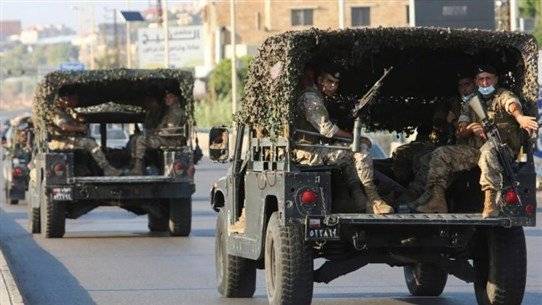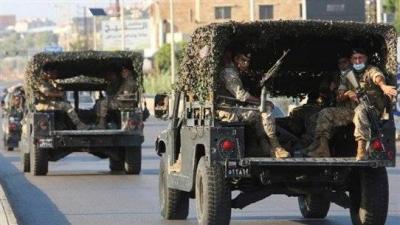After the successful attempts by a number of depositors to recover some of their deposits by storming the banks they entrusted with their money, it seems the string of incidents has unraveled further, taking on a new direction. The situation was manifested yesterday through several simultaneous "stormings," with reports indicating that one of the "heroes" involved is a military personnel. These attempts may remain limited and confined or could be organized and escalate to the point of chaos, which worries the military institution just like any other manifestation of "popular anger." Social security constitutes the greatest concern for military leadership, as Army Commander General Joseph Aoun continues to warn against the "greatest danger," which is the impact of the economic situation on social security with its repercussions in the streets. The worsening financial, economic, and living crisis is expected to expand "social and security chaos."
These movements cannot be resolved with security measures alone, as they are fundamentally political and economic in nature. Therefore, the army will once again face the challenge of dealing with these protest movements and expressions of dissent, knowing that the political authority is responsible for them; it is the authority that initially caused the crisis and subsequently failed—deliberately or ineffectively—to resolve it. It is also significant to note that military personnel are among those who suffer the most from this crisis. Thus, the army will address any mobilization on a "case-by-case" basis; it cannot prevent people from taking to the streets to express their anger and opinions, but it will respond to each movement accordingly, whether it is a demonstration, a bank storming, or another event.
The approach to handling the implications of the presidential entitlement concerning social security highlights fears of security instability or terrorist acts during each major constitutional and political event in Lebanon, either to obstruct this entitlement and postpone it or to determine its direction in accordance with those entities capable of "tarnishing" stability, be they internal or external. This anxiety about any security risks is heightened, especially with a lack of consensus among political factions domestically, and given the "ambiguity" surrounding the fate and trajectory of this entitlement—much like what is happening at this political juncture just before the constitutional deadline for electing a new president on October 31. This context raises "fateful" questions as well as the various open possibilities regarding this pivotal entitlement. These questions focus on security, particularly regarding the Lebanese army's role, status, and readiness.
Is it capable of controlling the situation and preventing it from spiraling out of control? Is it able to maintain security? Is it fundamentally capable of remaining cohesive? What if chaos ensues? What if President Michel Aoun decides not to leave the presidential palace upon the expiration of his term? How will the army react to this scenario? Several parties exclude the involvement of the army in such a "hellish" scenario, as such a development would mean that the country is headed toward a different situation—one that the army would not have the ability to confront or contain. Meanwhile, the international community consistently emphasizes the necessity of supporting and backing the army to keep it resilient, as outsiders are tangibly aware that the country's survival and continuity hinge on the military institution's endurance. Security and stability are entrusted to the army, which has proven itself multiple times and, through its cohesion and adherence to leadership decisions, navigated through difficult and perilous situations. It has "rescued" the country from various security crises, especially since the "October 17 Revolution" in 2019 through the parliamentary elections in May 2022, amid battles against terrorism, drug trafficking, and any chaotic movements in sensitive areas and refugee camps.
Informed parties consider that the scenario of "what to do" if Aoun remains in the presidential palace after the night of October 31 is not a serious consideration for the military leadership. The President cannot "carry" such a step, nor will he, along with the leader of the "Free Patriotic Movement," MP Gibran Bassil, take this "misstep," especially since Bassil is trying to work towards lifting American sanctions against him. Regarding any popular movements, whether in support of Aoun and accompanying his departure from the Baabda presidential palace or opposing him, the army will deal with them and with the presidential vacancy should it occur, as well as the post-term phase, based on its commitment to its oath, which prohibits any infringement on security and stability. The army is ready for any scenario or stage, just as it has always been—during the current term, after it, or at any time or circumstance. Its primary mission remains the same: to protect security and stability.
The fight against terrorism is not over. On the topic of terrorism, and concerning discussions about new movements from sleeper terrorist cells or the entry of "new terrorists" into the country, the army views this battle as open and ongoing since the battle of Fajr al-Jroud. It considers that this security battle has not ended because Lebanon is exposed to this terrorist threat based on its geographical context and position in a region constantly afflicted by this danger. The army continues to track and arrest terrorist cells, with the latest being the "al-Qaraoun Cell." While reports indicate that no new developments have occurred regarding the entry of terrorists into Lebanon, there remains a persistent fear of this threat, as smuggling terrorists into Lebanon is both possible and ongoing. When pressurized in Arab countries, they may "flee" to Lebanon. Consequently, the army's handling of the terrorism issue proceeds with the utmost precision, caution, and proactive security measures, continuously monitoring to prevent these cells from executing any terrorist activity.
However, the army's ongoing combat against these challenges and its prevention of "destructive chaos" necessitate elements to maintain its cohesion and resilience. This task appears to be solely assumed by the army commander, amidst a glaring and troubling absence of civil political authority. All urgent needs of the military institution reach them through the army commander's relentless efforts with the international community and donor entities, the latest being the Qatari grant, whereby the army receives a monthly amount from Doha, which is evenly distributed among its personnel. Each officer, soldier, or civilian employee in the army receives $100 per month from this grant. Moreover, the army commander's recent visit to Italy forms part of his external trips aimed at seeking support for the military; General Aoun requested assistance from the officials he met in Italy, which includes financial support for the soldiers, as well as fuel and food supplies—these are the army's most pressing needs—and he received promises of continued support, which have yet to be translated into specific measures.
This comes at a time when the army continues to receive aid from the United States—the main and largest supporter of the military institution—as well as assistance from residing and expatriate Lebanese and various organizations. Most of this aid is directed by the leadership primarily towards healthcare, considered vital for the military personnel, as the army now represents the sole public institution providing healthcare and hospitalization to active-duty service members or retirees, covering 100% for them and their families, despite the worsening crisis and shortages of medications and doctors.
Despite the difficult conditions and harsh circumstances faced by military personnel, akin to the majority of the Lebanese population and public sector employees, the army leadership remains optimistic about the institution's status, trusting in its personnel's capacity to fulfill their required missions—especially as numerous requests for voluntary enlistment have been submitted to the army, along with pleas for reinstatement from those who previously requested discharge or absconded from the institution.
What may provide the greatest reassurance regarding the army's situation, and thus the country's stability at a minimum, is that the international community continues to relay messages affirming its support for the army—whether through ambassadors in Lebanon or during the army commander's receptions or foreign visits—particularly emphasizing that aiding the army is essential for keeping it standing firm in order to prevent the country from collapsing and to maintain stability.




